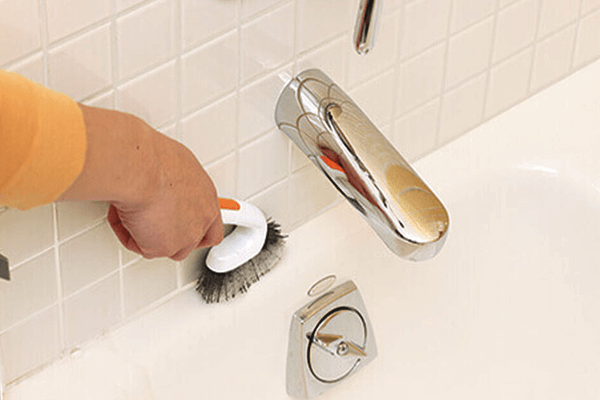Grout is a porous composition formed on the kitchen or bathroom floor that is lighter in color, but the color darkens as it develops. The grout stain can ruin the elegance of your clean bathroom or polished kitchen, so, besides cleaning the shower, sink, and other things, you should also give attention to the grout stains that have built up gradually over time and created stubborn stains.
But unfortunately, many people have confused about how to clean grout stains in the bathroom or kitchen as the stain does not come off with ease.
It is recommended to hire professionals for cleaning the stains, but if you want to do it by yourself, you can follow these methods to get an ablaze surface.

Know More
Best Tile and Grout Cleaning Machines for Home Use
How Long Does Grout Take To Dry?
Best Steam Cleaners for Grout
Does Steam Cleaning Damage Grout?
Easy Way of Cleaning Grout Stains from Your Bathroom or Kitchen
You can easily remove all the stains and molds by using some homemade cleaning solutions. But you should always start with the mildest concentration, if that does not work, you can gradually increase the concentration of the cleaner.
Step 1
One of the easiest ways to clean the grout stain is scrubbing the grout using a bristle brush or an old toothbrush, and plain warm water. Spray some water to the grout and scrub it slowly. Wait for some time and let it dry, it will help to remove mild stains and spills.
Step 2
Make a mixture of warm water and vinegar in a 1:1 ratio and spray it on the grout. Leave it for a few minutes. The acidic property of vinegar helps to get rid of the light stains and some heavier dirt. After a few minutes, scrub the grout with a stiff brush gently.
Step 3
If you want to try something harsh, apply a thick paste of water and baking soda as it helps to remove tough stains, mold, mildew, and built up grime. After that, spray some vinegar solution over the paste. You will see foaming as soon as you spray the vinegar. Let it sit for ten minutes. When the foaming stops, scrub the grout and clean it with normal plain water and dry it.
Step 4
If the stain becomes stubborn and does not come off with baking soda, you will need to use hydrogen peroxide. It is an effective cleaner with the mild antiseptic property. You can easily find this chemical compound in any drug store.
Pour some hydrogen peroxide to the grout straight, or, make a paste with hydrogen peroxide and baking soda, and coat the grout with a thick layer of the paste. Leave it at least ten minutes and after that, scrub it in a circular motion to remove the stain. Now rinse the place with plain water.
Step 5
For more tough stains, you can use oxygen bleach or chlorine bleach as a grout cleaner which usually comes in a powdered or spray form. Before applying bleach, make sure that your kitchen or bathroom area is well ventilated.
First, read the manufacturer’s directions and precautions. Sprinkle the powder bleach or spray the bleach to the grout and leave it for 10-15 minutes. Do not mix the bleach with any ammonia products, not even by mistake, it can release toxic gas. Always try to use hand gloves and a mask while using bleach. After 10 minutes, rinse it thoroughly with plain water.
Do not forget to wash away all the leftover previous attempts with vinegar. Even a little amount of vinegar can produce toxic chlorine gas if mixed with bleach. Also, do not use bleach frequently to remove grout. Although bleach can break down the heaviest stubborn dirt and stain, the use of bleach should be limited.
Step 6
Another effective way is using steam to clean the stubborn stains off the grout. You can use a steam mop to clean the stain as the steam mops work better than the regular mops.
Step 7
Try a commercial cleaning solution to clean all the stains, molds, and germs from your kitchen or bathroom. You will find these cleaners to the market or any online store. You can use the cleaner by two methods— spray and scour.
Cleaners that come in spray form do not need to be scrubbed, so it can save your energy and time. The drawback of these products is, they contain harsh chemicals, solvents, or chlorine, so they may be harmful for the floor and tiles. On the other side, you have to provide some effort for cleaners that need scouring, but they are not as harsh as the spray ones. Both varieties of cleaners have active ingredients, so you can choose any option.
If you still have confusion or you’re not satisfied with the DIY cleaning process, you can go for professionals. The professional cleaners will clean the tiniest stain effectively and without doing any harm to the floor as they use high-quality equipment and cleaning products.
Can I use lemon juice to clean grout?
Yes, you can use lemon juice as a natural cleaner as it has an acidic pH that can eat the stubborn discoloration of grout. Also, it will give you a fresh smell to make you feel better. Spray some lemon juice on the grout and leave it for ten minutes. After that, scrub it with a brush. If the stain is mild to moderate, it will be removed easily. You may need to apply it 2-3 times to get a better result.
Can toothpaste remove the grout stain?
You can also use toothpaste and a toothbrush for removing the grout stain. Take a small amount of toothpaste and coat the stain with the paste. Let it sit for a few minutes and then, just scrub it with your old toothbrush or any other scrubber. After washing the place with plain water, you will see the stain has faded. It can remove the mild grout stains.
Is hydrogen peroxide harmful for grout?
Although hydrogen peroxide is a chemical compound, it is safe to use, as it is a neutral chemical cleaner. It can not eat away the dirt and stain alone. When it is mixed with baking soda or dish soap, it can clean the stain without doing any harm to the floor or tile.
Conclusion
These are the most effective ways to clean the grout stains of your bathroom and kitchen. To prevent the stains from coming back, you should clean the grout every week with some mild cleaners, like vinegar, alcohol, etc., so you can save your effort and time in the future.
